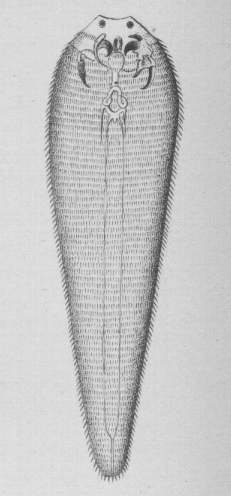Linguatula serrata
A parasitic organism affecting mammals, including humans
Linguatula serrata is a parasitic organism belonging to the phylum Arthropoda and class Pentastomida. It is commonly known as the "tongue worm" due to its tongue-like appearance. This parasite primarily infects the respiratory tract of carnivorous mammals, including canids and occasionally humans, causing a condition known as linguatulosis.
Morphology[edit | edit source]
Linguatula serrata exhibits a flattened, elongated body that resembles a tongue, hence its common name. The adult parasite can reach lengths of up to 13 cm. It possesses a segmented body with a series of hooks and spines that aid in attachment to the host's tissues. The anterior end of the organism is equipped with a mouth surrounded by four hooks, which are used to anchor itself within the host.
Life Cycle[edit | edit source]
The life cycle of Linguatula serrata involves two hosts: a definitive host and an intermediate host. The definitive hosts are typically carnivorous mammals such as dogs, wolves, and foxes. The intermediate hosts are usually herbivorous or omnivorous animals, including ruminants and occasionally humans.
Definitive Host[edit | edit source]
In the definitive host, adult Linguatula serrata reside in the nasal passages and sinuses. They reproduce sexually, and the female lays eggs that are expelled through the host's nasal secretions or feces.
Intermediate Host[edit | edit source]
Intermediate hosts become infected by ingesting eggs present in contaminated food or water. Once inside the intermediate host, the eggs hatch into larvae, which migrate through the intestinal wall and travel to various organs, particularly the liver and lungs, where they encyst.
Pathogenesis[edit | edit source]
In definitive hosts, the presence of adult parasites in the nasal passages can cause irritation, nasal discharge, and respiratory distress. In intermediate hosts, the migrating larvae can cause tissue damage and inflammation, leading to symptoms such as abdominal pain, fever, and in severe cases, organ dysfunction.
Diagnosis[edit | edit source]
Diagnosis of linguatulosis in definitive hosts is often based on the identification of eggs in nasal secretions or feces. In intermediate hosts, imaging techniques such as ultrasound or CT scan may be used to detect cysts in the organs.
Treatment[edit | edit source]
Treatment of linguatulosis involves the use of antiparasitic medications to eliminate the adult parasites in definitive hosts. Surgical intervention may be necessary to remove cysts in intermediate hosts.
Prevention[edit | edit source]
Preventive measures include controlling the exposure of potential intermediate hosts to contaminated food and water, as well as managing the population of definitive hosts to reduce the spread of the parasite.
Related pages[edit | edit source]
Search WikiMD
Ad.Tired of being Overweight? Try W8MD's physician weight loss program.
Semaglutide (Ozempic / Wegovy and Tirzepatide (Mounjaro / Zepbound) available.
Advertise on WikiMD
|
WikiMD's Wellness Encyclopedia |
| Let Food Be Thy Medicine Medicine Thy Food - Hippocrates |
Translate this page: - East Asian
中文,
日本,
한국어,
South Asian
हिन्दी,
தமிழ்,
తెలుగు,
Urdu,
ಕನ್ನಡ,
Southeast Asian
Indonesian,
Vietnamese,
Thai,
မြန်မာဘာသာ,
বাংলা
European
español,
Deutsch,
français,
Greek,
português do Brasil,
polski,
română,
русский,
Nederlands,
norsk,
svenska,
suomi,
Italian
Middle Eastern & African
عربى,
Turkish,
Persian,
Hebrew,
Afrikaans,
isiZulu,
Kiswahili,
Other
Bulgarian,
Hungarian,
Czech,
Swedish,
മലയാളം,
मराठी,
ਪੰਜਾਬੀ,
ગુજરાતી,
Portuguese,
Ukrainian
Medical Disclaimer: WikiMD is not a substitute for professional medical advice. The information on WikiMD is provided as an information resource only, may be incorrect, outdated or misleading, and is not to be used or relied on for any diagnostic or treatment purposes. Please consult your health care provider before making any healthcare decisions or for guidance about a specific medical condition. WikiMD expressly disclaims responsibility, and shall have no liability, for any damages, loss, injury, or liability whatsoever suffered as a result of your reliance on the information contained in this site. By visiting this site you agree to the foregoing terms and conditions, which may from time to time be changed or supplemented by WikiMD. If you do not agree to the foregoing terms and conditions, you should not enter or use this site. See full disclaimer.
Credits:Most images are courtesy of Wikimedia commons, and templates, categories Wikipedia, licensed under CC BY SA or similar.
Contributors: Prab R. Tumpati, MD

